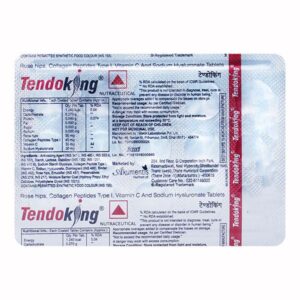SODIUM + COLLAGEN ABSORBABLE HAEMOSTAT + Vitamin C
Sodium: Drug: Sodium
Use: Sodium is used as an electrolyte replacement in patients with conditions such as dehydration, electrolyte imbalance, and excessive sweating. It is also used in the treatment of certain medical conditions like hyponatremia (low sodium levels in the blood), adrenal insufficiency, and diabetic ketoacidosis.
Mechanism of Action: Sodium plays a vital role in maintaining the balance of fluids and electrolytes in the body. It helps regulate blood pressure, osmotic pressure, and pH levels. As an electrolyte, sodium helps conduct electrical impulses necessary for various bodily functions, including muscle contraction and nerve signaling.
Dose: The appropriate dosage of Sodium varies depending on the individual and the specific medical condition being treated. It is typically prescribed and administered intravenously under medical supervision. The dosage may range from 1 to 10 grams of sodium chloride solution, depending on the severity of the electrolyte imbalance or dehydration.
Side Effects: Sodium is generally safe when used as directed. However, excessive or rapid administration of sodium can lead to side effects such as:
1. Fluid overload: Excessive intake of sodium can cause fluid retention, resulting in swelling and edema.
2. Increased blood pressure: Sodium can contribute to elevated blood pressure levels, especially in individuals who are sensitive to sodium.
3. Electrolyte imbalance: Overuse or incorrect use of sodium can disrupt the balance of other electrolytes in the body, such as potassium or calcium, leading to further complications.
4. Allergic reactions: Some individuals may have an allergic reaction to sodium, resulting in symptoms like rash, itching, or difficulty breathing. In such cases, medical attention should be sought immediately.
5. Hypernatremia: In rare cases, high levels of sodium in the blood can lead to hypernatremia, causing symptoms such as increased thirst, confusion, seizures, and coma. This condition requires urgent medical attention.
It is important to consult with a healthcare professional to determine the appropriate dosage, treatment duration, and any potential risks associated with the use of sodium.
Collagen Absorbable Haemostat: Collagen Absorbable Haemostat is a medical device used to assist in controlling bleeding during surgery or other medical procedures. It is a sterile, white, porous, absorbable material made from highly purified bovine collagen.
The main use of Collagen Absorbable Haemostat is to achieve hemostasis, which is the process of stopping bleeding. It is commonly used in surgical procedures, dental surgeries, and other interventions where bleeding control is necessary. The device helps in the formation of a fibrin clot, which promotes the cessation of bleeding and supports the body’s natural healing process.
The mechanism of action of Collagen Absorbable Haemostat involves the interaction of collagen fibers with platelets and fibrinogen in the blood. When the device comes into contact with blood, it activates the clotting cascade, leading to the formation of a stable clot that stops the bleeding.
The recommended dose and application technique may vary depending on the specific surgical procedure and the surgeon’s preference. Typically, Collagen Absorbable Haemostat is cut or shaped to fit the bleeding site, and pressure is applied to ensure proper contact with the bleeding vessels.
As with any medical intervention, there may be some potential side effects associated with the use of Collagen Absorbable Haemostat. Adverse reactions are generally rare, but they can include infection, allergic reactions, tissue irritation, and localized inflammation at the application site. In some cases, the device may cause an immune response, leading to the formation of granulomas or foreign body reactions.
It is important to consult with a healthcare professional for advice on the appropriate use of Collagen Absorbable Haemostat in a specific medical context.
Vitamin C: Drug: Vitamin C (Ascorbic Acid)
Use: Vitamin C is an essential nutrient involved in various biological processes. It is commonly used as a dietary supplement to prevent or treat vitamin C deficiency, support the immune system, promote wound healing, and act as an antioxidant.
Mechanism of Action: Vitamin C acts as a cofactor in many enzymatic reactions in the body. It plays a key role in the synthesis of collagen, a protein component of connective tissues, skin, blood vessels, and bones. It also helps in the absorption of iron from plant-based foods, enhances the immune system’s function, and acts as an antioxidant by scavenging free radicals.
Dose: The recommended daily allowance (RDA) of vitamin C varies depending on age and gender. For adults, the RDA ranges from 75-90 mg/day for women and 90-120 mg/day for men. In certain conditions like pregnancy, lactation, or during illness, higher doses may be recommended under medical supervision.
Side Effects: Vitamin C is generally considered safe when taken orally in recommended doses. However, high doses of vitamin C (>2000 mg/day) may lead to digestive symptoms such as diarrhea, nausea, abdominal cramps, and bloating. In rare cases, excessive intake may cause kidney stones in susceptible individuals. Individuals with a history of kidney stones or iron overload disorders should exercise caution and consult a healthcare professional.
It is important to note that vitamin C obtained through diet (fruits, vegetables, etc.) is typically safe and offers other beneficial compounds like fiber and phytochemicals, while supplementation should only be used as directed or under healthcare professional guidance.

